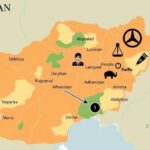Conflicts
Politics
- E - TALIBAN PAKISTAN, AFGHANISTAN, ASIA, DONALD TRUMP, INTERNATIONAL RELATIONS, KABUL, KHALILZAD, KHAN, NATIONAL SECURITY, NORTH AMERICA, RADIO PAKISTAN, SECURITY, SIRAJUDDIN HAQQANI, STATE DEPARTMENT, TALIBAN, TEHREEK - E - TALIBAN PAKISTAN, TERRORISM, U. S, UNITED STATES, YAHYA HAQQANI
Omar El-Sharif
New Era in Afghan Diplomacy: U.S.-Taliban Talks and Pakistan’s Concerns
Kabul is central to new diplomatic developments, marking a significant shift in U.S.-Taliban relations led by Zalmay Khalilzad. Sirajuddin Haqqani has reportedly been removed from the U.S. bounty list, yet ambiguity remains. Diplomatic overtures have intensified even as relations between Afghanistan and Pakistan strain. Pakistan’s influence appears to wane amid direct U.S.-Taliban negotiations, raising concerns.
Recent developments in Kabul have positioned it as a key player in reshaping Afghanistan’s political landscape and its relations with neighboring nations. Zalmay Khalilzad, a seasoned U.S. diplomat, signifies a paradigm shift with direct U.S.-Taliban negotiations that bypass traditional intermediaries. This strategic change has raised apprehensions in Pakistan, which had anticipated leveraging earlier U.S. policies to induce the Taliban to confront the Tehreek-e-Taliban Pakistan (TTP) threat.
Moreover, it has been reported that Sirajuddin Haqqani, a senior Taliban official, is now off the U.S. State Department’s “Rewards for Justice” list. However, he remains classified as a wanted individual by the FBI, creating some inconsistency regarding his status. Additionally, the U.S. has lifted bounties on three prominent figures of the Haqqani network, revealing a possible shift in American policy despite existing discrepancies among federal agencies.
During Khalilzad’s visit, Mohammad Sadiq Khan, Pakistan’s special representative for Afghanistan, also met with Taliban officials. This marked his second visit to Kabul, following instruction from Deputy Prime Minister Mohammad Ishaq Dar to enhance bilateral relations. These interactions symbolize a significant moment as the Taliban strives to assert its governance domestically and internationally.
Despite these diplomatic efforts, the dynamics between Afghanistan and Pakistan remain strained. Escalating border tensions have resulted in heightened confrontations between Taliban and Pakistani officials. Khan’s appointment as the special representative raised initial hopes for stabilization, yet the situation has escalated, reflected in the Taliban’s foreign minister’s remarks highlighting Pakistan as their only contentious neighbor.
The schism was further exposed when the Pakistani military conducted airstrikes on a TTP site in Afghanistan’s Paktika province during Khan’s earlier visit, signaling potential unease within Pakistan’s Inter-Services Intelligence regarding collaboration. These airstrikes highlighted Pakistan’s inconsistent stance towards the Taliban, caught between diplomatic efforts and military operations.
Khan’s latest Kabul visit underscores Pakistan’s urgent need to restore relations and quell rising tensions. He indicated, via his official X account, that both nations agreed to engage in high-level dialogues. However, Pakistan’s anxiety has intensified, particularly with the U.S.’s direct engagement with the Taliban undermining its strategy to use American leverage against the Taliban.
The U.S. delegation’s ongoing negotiations in Kabul reflect a transformative moment for U.S.-Taliban relations. Khalilzad’s established rapport with the Taliban and discreet lobbying efforts have facilitated this unprecedented dialogue. A significant consequence of these talks was the Taliban’s purported success in having Sirajuddin Haqqani removed from the U.S. global terrorism list in exchange for an American prisoner’s release.
For Pakistan, this shift presents both opportunities and challenges. Pakistani officials were hopeful that a tougher U.S. stance would align with their objectives against the TTP, particularly following a joint operation that apprehended a suspect linked to an attack in Kabul. However, with the U.S. now negotiating directly with the Taliban, Pakistan’s influence appears to be diminishing amid an increasingly intricate regional landscape.
The diplomatic developments in Kabul signify a pivotal change in Afghanistan’s political dynamics, particularly concerning U.S.-Taliban relations. The suspension of bounties and direct negotiations underscores a shift in U.S. policy that could diminish Pakistan’s influence, heightening its concerns regarding security and regional stability. As both the U.S. and the Taliban engage in direct dialogue, the broader implications for Afghanistan-Pakistan relations and the ongoing challenges posed by the TTP remain critical considerations.
Original Source: resonantnews.com








Post Comment